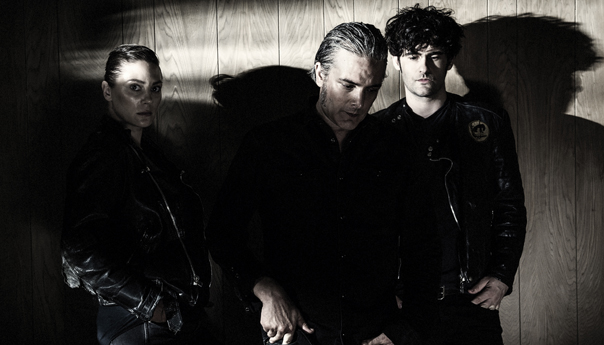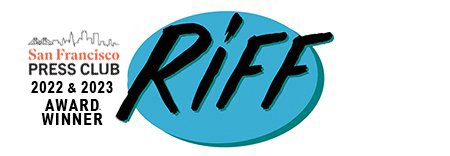Q&A: Black Rebel Motorcycle Club free from the shadow of grief

Courtesy: Tessa Angus
As Black Rebel Motorcycle Club was recording 2013 album Specter at the Feast, the trio was still reeling from the 2010 death of one of their own. Michael Been, the father of frontman Robert Levon Been, had died suddenly at one of their shows. The elder Been, who in the ‘80s fronted his own popular band The Call, was working as a sound tech with BRMC.
Black Rebel Motorcycle Club
Restavrant
8 p.m., Wednesday, May 23
The Fillmore
Tickets: $35.
Like the record’s title implied, a specter hung over the proceedings. But while that album was filled with mourning, it didn’t allow Robert Levon Been to fully accept his father’s death. It would take another five years, until Black Rebel Motorcycle Club’s new album, Wrong Creatures, for him to come to terms with it.
“I just remember feeling really free from the shadow of mourning that was hanging over the last album, so a part of it was liberating to get to write completely with a clean palate again,” Been said in a recent interview. “But with that freedom, I found myself making the choice, on my own, to go back and actually revisit some of those feelings that I wasn’t as able, or was reluctant to go … on the last album.
“It’s funny; …the difference of writing a song because someone thinks you’re supposed to,” he said. “I remember thinking that I constantly felt like I’m supposed to acknowledge this huge thing that had been going on in our lives. It’s like Rebellion 101—just not wanting to do the things that you’re … expected to do.”
The death of the elder Been was not the only trauma the band has had to deal with in recent years. In 2014, drummer Leah Shapiro needed brain surgeryto remove an abnormality that had left her nearly incapacitated. Her personal road to health was not an easy one.
Black Rebel Motorcycle Club would go on to write and record what would become Wrong Creatures (released in January) in two batches, which Been said complicated matters and dragged out the process, making the him, Shapiro and guitarist Pete Hayes question their decisions.
“This [was] the hardest record to make,” Been said. “Of course, having to make [Spector at the Feast] right after Michael passed away was difficult, but… we all gave each other a certain amount of time, space and support. Because everyone was going through that. That seems to have gone away. … We’re really hard on ourselves for trying to create something that’s needed.
“[Wrong Creatures] isn’t just an album because we were supposed to put out something, but to try and find something genuine to say that you haven’t [before]; a place you haven’t gone before, and not just repeat yourself. The biggest fear is it turning into a business and a job. I think all of us push against that.”
Wrong Creatures is a characteristically dark album. Produced by Nick Launay (Nick Cave and the Bad Seeds, Yeah Yeah Yeahs), it recalls storytellers like Cave, Lou Reed and Leonard Cohen. Uncharacteristically, it’s not as much of an adrenaline rush as previous BRMC records. Instead, many of the highlights are quiet, reflective moments on atmospheric slow-burners like “Haunt” and “Echo.”
***
How much did your father’s death and Leah Shapiro’s medical scare affect you while you were making this album?
Robert Levon Been: You know, when you’re dealing with such heavy loss, or brain surgery … it just becomes too much to shoulder. So I think we all kind of [have a] dark sense of humor about the whole thing. … I find the humor in the fact that we can’t ever seem to get a break. … It gets to the place where you can kind of start laughing at the things that scare you the most. Because it’s all getting a bit ridiculous, to the point where I can’t even talk about it seriously anymore. But I think that’s a good thing. You spend a lot of time taking life very seriously, and then at a certain point, it’s gratuitous.
As far as how it affects the music, I think there’s more weight in it now. I’ve lived more life and more experiences,and living through heavier things than you do sometimes in your teens and twenties. … But at the same time, it’s a rock band, so you kind of also get to use it as medicine to exorcise your demons, and get all of that out of your mind and your heart. … It’s all those things at once.
Were there other events that influenced you during this time?
We’re very fortunate to have had Michael [Been] with us for so long. He kind of held us together. I feel like Nick Launay, who produced this album—he came into it in hopes to be that sounding board. He had a really good outlook on … life and music that really helped keep our feet on the ground. The last thing you want is a band locked in a room together; everyone’s kind of digging as deep as they can into unknown territory. So it helps to have a referee to keep things a little bit sane.
What are the things you wanted to tell listeners with the new songs?
Like all things, you hope to inspire the question more than the answer. As far as a message, it’s just a feeling. Our music is coming from an honest place. We don’t even fully understand, but the feeling is real, and the feeling is raw, and for myself it’s either there or it’s not. … It’s more [about] creating a world, or creating a place where people can feel something, but I don’t want to tell them what it should be. The hope is that it can be personal for each person listening. …
A lot of the … fun, rock and roll, high octane, the “sky’s the limit” songs we removed the last couple of weeks before we put the album out. It was a 16-song album, and we had a lot of fire-and-fury rock songs. We took most of them off because the idea of creating a world, and the hope that we could bring people into a trance-like state … was more appealing, than seeing how much we could fuck with people from going to one world to the next, to the next, to the next. So we took those off, and were actually going to release them all on a cassette that comes in this vinyl box; no titles, no tracks—just a black tape so people can figure it out. Maybe down the road, we’ll start playing those live and present them to people … as an EP or something. But it’s just one side of the album. When you actually go through the whole thing, it has a different nature.
The classic-sounding bass intro on “Echo” recalls Lou Reed’s “Walk on the Wild Side.” What inspired it?
The first time we started the melody, the bass line and the chorus might have been during the Beat The Devil’s Tattoosessions [in 2010]. It was a half-formed idea. I didn’t really know what to write about yet. We all loved the melody, but it just wasn’t calling us. We couldn’t go all the way in at that time, but for years I couldn’t get the thing out of my head, so for this album I tried to find a story in it. The song felt very tender, more so than other songs. Lyrically, it became the first actual love song that wasn’t too bittersweet. I think we’ve had our fair share of bittersweet love songs, but this one feels more like our first genuine love song. The music helps it feel like a safe place to speak that point of view and share something more intimate.
Musically, though, we got in a fight a lot of times … pushing and pulling how small and intimate to keep it, versus how grand. … The bass line had such a “Walk on the Wild Side” nod. I didn’t want to shy away from it. I wanted to pay respect to it. … I remember always loving it. There’s a few songs like this, that as soon as the first couple seconds of the song begins, before anyone starts singing or anything, you’re already in love, and you’re already there. There’s certain Stooges songsthat do that; Marvin Gaye,[too]. … A lot of songs aren’t like that; it takes until the vocals start,or the story pulls you in. Then Petewrote this bridge outro melody, which I thought was one of the best bridges, melodically, I’d heard, and that really made the song feel like, “OK, we can’t put it off anymore.”
“Haunt” was similar. … There was a little bit of a nod to Leonard Cohen and true storyteller-songwriters that bring you in with a whisper and a rasp, and it feels very intimate. … I was very nervous writing this song because it felt like sacred ground. I was so scared to not do it justice. … It’s intimidating to step into that arena, because the bar is so fucking high. I can’t pull a whole record off like that, but I can get away with four minutes.
Follow Roman Gokhman at Twitter.com/RomiTheWriter.
